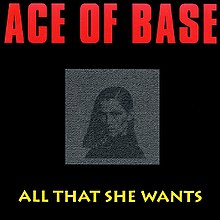All That She Wants
| "All That She Wants" | ||||||||
|---|---|---|---|---|---|---|---|---|

Standard European cover (Scandinavian CD single pictured)
|
||||||||
| Single by Ace of Base | ||||||||
| from the album Happy Nation and The Sign | ||||||||
| B-side | "Fashion Party" | |||||||
| Released | 1992 | |||||||
| Format | ||||||||
| Recorded |
|
|||||||
| Genre | ||||||||
| Length | 3:30 | |||||||
| Label | ||||||||
| Writer(s) | ||||||||
| Producer(s) | ||||||||
| Ace of Base singles chronology | ||||||||
|
||||||||
|
||||||||
"All That She Wants" is a song by Swedish group Ace of Base. It was released in 1992 as the second single from their first studio album, Happy Nation. The following year, it was released as the first single from The Sign in North America. Produced by Denniz Pop, Jonas Berggren, and Ulf Ekberg, the song was inspired by the Kayo song "Another Mother".
"All That She Wants" is a reggae-pop song which describes a sexually promiscuous woman, with the word "baby" being synonymous to "boyfriend". The song was first recorded in 1991, but went through many renditions before it was officially released.
The song was a commercial success, reaching the top of the charts in many countries, including Denmark, Germany, the United Kingdom, and Australia. The single was certified platinum in the United States, where it peaked at number two, behind Meat Loaf's "I'd Do Anything for Love (But I Won't Do That)". The single sold over 1 million copies in 1993 in the United States alone, and became one of the best-selling singles of that year. On 7 July 2014, the single was re-released with new remixes as a digital EP.
While the group's predecessor single, "Wheel of Fortune", was a modest success, "All That She Wants," led Ace of Base to take off internationally. After hearing Swedish top 20 hit "Another Mother" by Kayo, the band decided that this was exactly the sound they wanted to create. In 1991, the group produced a demo version of "All That She Wants", titled "Mr. Ace", which featured different lyrics, Linn on lead vocals, and rap vocals performed by both Jonas and Ulf. The song was initially in major key, but was changed to minor upon Linn Berggren's insistence.
...
Wikipedia
